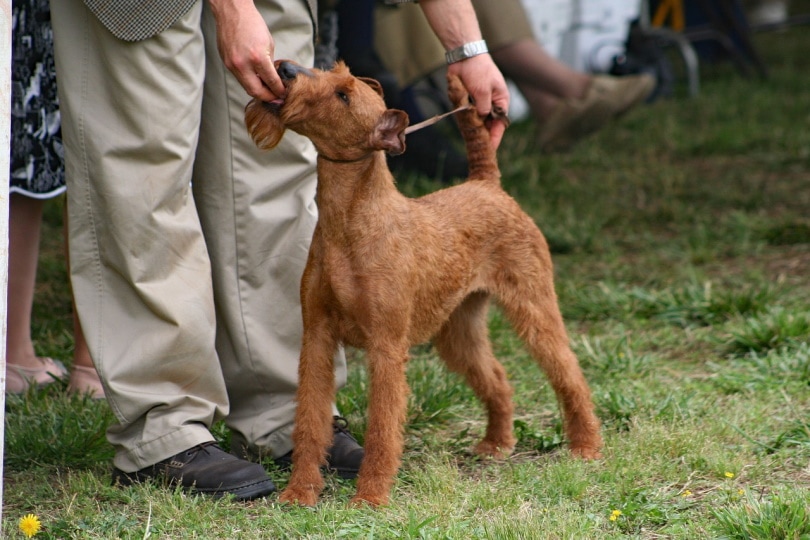In this article
The American Kennel Club (AKC) provides registration for purebred dogs in the United States. In fact, it is one of the largest purebred registries in the world. It has over 5,000 licensed members and a variety of different affiliated organizations.
The AKC has different types of registration. Both limited and full registration is available. Knowing the significance of each one is essential to register your dog appropriately.
In this article, we look at both registration options.

What Is a Full AKC Registration?
Full registration is just what it sounds like: it has all the perks of being registered with the AKC. It’s designed mostly for those who breed dogs, as it certifies the dog to breed and participate in dog shows.
For the most part, full registration is only done by those who plan on breeding their dogs. It enables you to register any litter that your dog produces, something that isn’t important for those who aren’t breeding their dogs.
Without this registration, the puppies that your dog produces will not be available for registration. Both parent dogs need to have full registration with the AKC for their puppies to be registered.
Full registration paperwork is white with a purple border. You can show your dog in competitions and dog shows with this registration. It provides the same benefits as a limited registration in this manner.
Generally speaking, full registration is much rarer than it used to be. Many breeders will sell whole litters with limited registration unless the buyer specifically asks for it. Often, puppies with full registration cost much more than those without it. For the most part, dogs with full registration can produce puppies with AKC registration.
Breeders often refer to this as “breeding rights.” You aren’t necessarily buying the right to breed the dog—you’re buying the right to register their puppies with the AKC.
This system works to discourage outsiders from entering the breeding system. After all, you need to purchase specific dogs for a higher price to begin producing puppies. But this also diminishes the number of quality dogs available.
When not all adults can be bred with AKC registration, you end up with fewer puppies overall.
Many breeders are encouraging the AKC to eliminate differences in registration for this reason. AKC-registered breeders are leaving or becoming too old to breed, and new breeders are not necessarily taking their place due to the increased red tape that full registration has.
What Is Limited AKC Registration?

Limited AKC registration is cheaper and has a few limits, as the name suggests. Simply speaking, it enables the dog to be registered in the AKC, but any puppies that they produce are ineligible.
For the most part, this type of registration is used by those who are not planning on breeding their dog. Many breeders sell puppies for cheaper with limited registration. It is implied that these dogs are not going to be bred (though, of course, they could be—their puppies just can’t be registered).
Limited registration may be changed to full registration by the litter’s owner, but only after applying for a revocation of the limited registration and paying a fee.
Limited registration paperwork is white with an orange border. This coloration sets it apart distinctively from the full registration, which has a purple border.
The main purpose of this limited designation is to withhold registration papers for any litter coming from a non-breeding home. It sets up extra barriers to breeding AKC-registered dogs, protecting the breeder’s business.
It enables the breeders to request that certain puppies not be used for breeding. It provides breeders with the opportunity to sell their dogs to the public without providing breeding rights.
Today, fewer and fewer dogs are being sold with full registration. In some cases, limited registration dogs are still being bred and registered with other registries. This procedure is becoming more common as fully registered puppies become more expensive.
Truthfully, limited AKC registration doesn’t mean much. Dogs with it can’t be shown in shows, and the registration can’t be passed to future generations. Generally speaking, it’s the same as having a dog without any registration, except it costs money.
For this reason, many new owners don’t request limited registrations from the AKC.
Does Full AKC Registration Mean Breeding Rights?

Yes, typically, this sort of registration means the dog can be bred and their puppies registered with the AKC. Full registration is for any dog that is going to be bred or actively shown in the confirmation ring.
A full AKC registration is required for both of these functions. With just a limited registration, you can’t do either of these things.
Some breeders sell full registrations as “breeding rights.” This is only a slight change in vocabulary; it doesn’t actually change the function of the registration.
Many breeders insist that dogs going to pet homes do not need a full registration. Therefore, they typically don’t provide them unless specifically asked (and even then, not all breeders will provide a full registration for any of their puppies).
Do I Need AKC Registration?
If you don’t plan on entering your dog in any AKC competitions, then you don’t need an AKC registration. Note that an AKC registration is not a mark of quality. Registration simply means that the puppy was registered as the offspring of a fully registered dog—no one from the AKC checks on the puppy (or even ensures that the puppy exists).
Puppies without registration are just as likely to be high-quality. With the rise in limited registrations, this is becoming more common. Therefore, we don’t recommend basing the dog’s quality on whether they have a registration.
Instead, medical records and genetic testing are better indications of quality.

Final Thoughts
There are few benefits to having a limited AKC registration. The only real benefit is that you can enter your dog in certain competitions, such as field trials. However, the dog’s offspring cannot be registered with the AKC (if they ever have any) and cannot be entered into dog shows.
On the other hand, fully registered dogs can be shown in dog shows, and their puppies can be registered. It provides significant benefits to those who want to interact with the AKC. In fact, without this registration, you can’t interact with the AKC at all.
Fewer puppies are being sold with full registrations, however. Therefore, more high-quality puppies are being sold without registration. It’s important to know that registration is not an indication of quality. Even with registration, you need to do your proper research to ensure that you’re getting a quality puppy.
Featured Image Credit: Mockup photo created by DCStudio – www.freepik.com



















